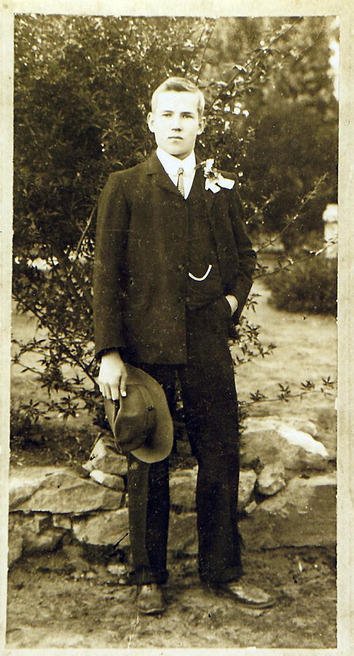Fritz's father died unexpectedly
In November 2000 Fritz wrote the following to his second cousin, Carine Nel, who was putting together a book of letters and other documents descibing the lives as missionaries in Zululand of her great-grandparents, Friedrich and Johanna Schumann:
"You wrote that my father died suddenly the night before a wedding. It was the wedding of Luischen Bősser and Hugo Műller of Pomeroy, held on the small Bősser farm near Bethel, where Walter Schirge later lived. My father had never been ill; he died quite unexpectedly of a stroke [at 53]. I had just completed my first year of teaching [aged 23] - at Warner Beach. I earned ₤21 [US$85] per month and had to make payments of ₤6-6s-6d [US$26] on a student loan. Board and lodging cost me ₤9 [US$36], so I had about ₤6 [US$24] left in my pocket. There was no widow's pension in those days and, since we [the rest of the family: mother and eight siblings] had lived in a rented house – the teacher's house at Glűckstadt – my mother had no home and no income. We had to leave the house. My three youngest siblings (Kurt, Eduard and Ulla) were still at school, and the future looked very bleak. I was transferred [by the Education Department] to Durban and we rented a place in Escombe, between Durban and Pinetown. For a time, I tried, as the eldest son, to send the younger siblings to school at Hermannsburg, but that wasn't possible with my ₤6 per month, so they had to learn how to earn a living early on – Kurt in the building industry, Eduard in the Post Office and Ulla, after a short course at the Technical College, as a secretary. I was appointed a relief teacher and was sent all over the province [Natal] to help out. My siblings more or less stood on their own feet and could look after their own futures, and my mother stayed stayed either with Brunhilde [second daughter] at their Gingindhlovu farm or with Friedeborg [third daughter] at their Denny Dalton farm. My mother died in 1976 and is buried in the Ashley Cemetery in Pinetown."
(translated by Helmuth from "Friedrich und Johanne Schumann" by Carine Nel, 2002)


